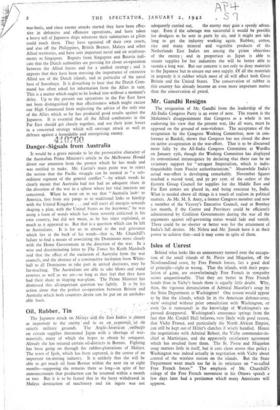Danger-Signals from Australia
It would be a grave mistake to let the provocative character of the Australian Prime Minister's article in the Melbourne Herald divert our attention from the protest which he has made and was entitled to make. Mr. Curtin's main point was to reject the notion that the Pacific struggle can be treated as " a sub- ordinate segment of the general conflict "—by which words he clearly meant that Australia had not had an adequate share in the direction of the war in a sphere where her vital interests are concerned. When he went on to say that " Australia looh to America, free from any pangs as to traditional links or kinship with the United Kingdom . .. and will exert all energies towards shaping a plan, with the United States as the keystone," he was using a form of words which has been severely criticised in his own country, but did not mean, as he has since explained, as much as it appeared to. But that is a question which can be left to Australians. It is for us to attend to the real grievance which lies at the back of his words—that is, Mr. Churchill's failure to find a means of associating the Dominions more closely with the Home Government in the direction of the war. In a wise and discriminating letter to The Times Sir Keith Murdoch said that the effect of the exclusion of Australia from the war councils, and the absence of a constructive invitation from White- hall to all Dominions to take part in united decisions, may be far-reaching. The Australians are able to take blows and stand reverses as well as we are—so long as they feel that they have had their share in shaping war-plans. The Prime Minister has dismissed this all-important question too lightly. It is by his action alone that the perfect co-operation between Britain and Australia which both countries desire can be put on an unshake- able basis.


























 Previous page
Previous page